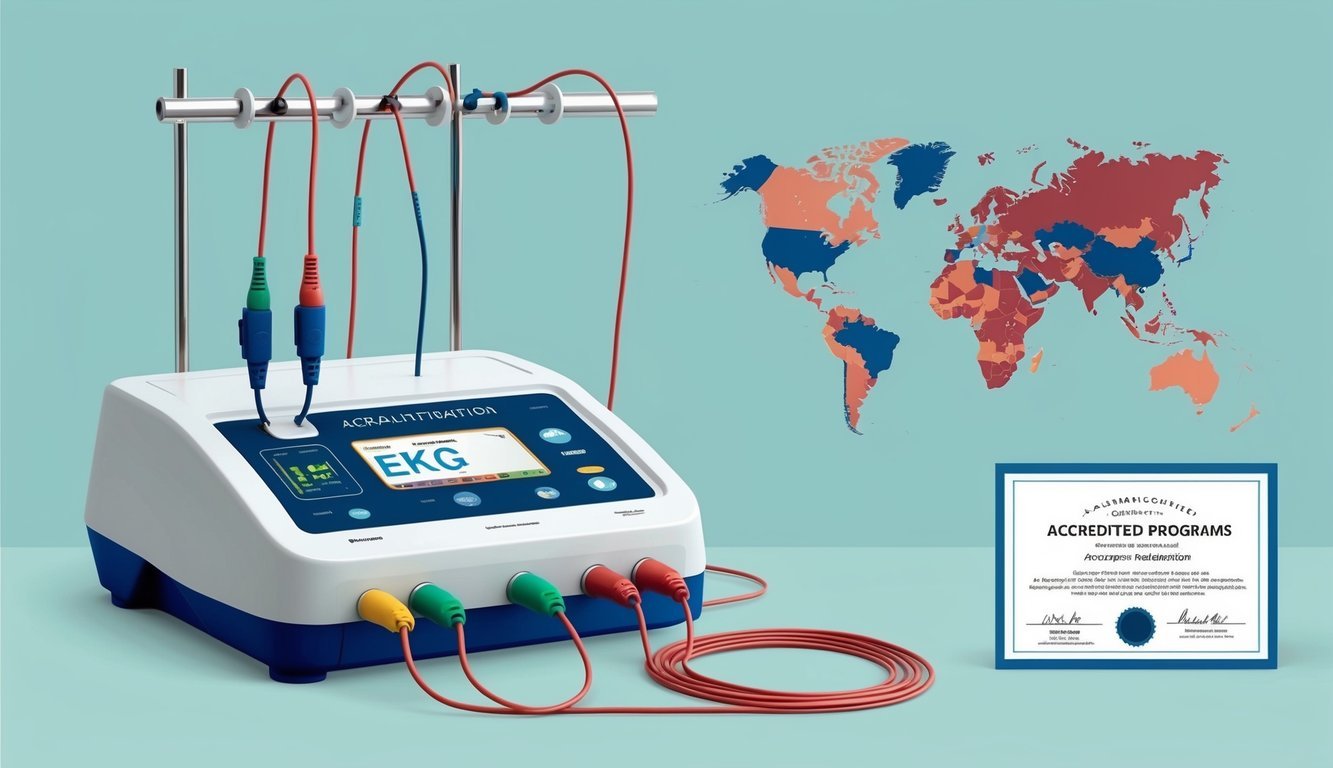As you consider a career as an EKG technician, it’s important to find the right educational path. Accredited EKG technician programs are essential for gaining the necessary skills and knowledge to succeed in this growing field.
Various options are available near you, offering training that meets industry standards and prepares you for certification.
These programs typically include both coursework and hands-on experience.
You will learn about the electrical activity of the heart and how to perform EKGs, Holter monitoring, and stress tests.
Completing the right program can prepare you to earn your Certified EKG Technician (CET) credential, which is highly regarded in the healthcare industry.
Finding a program that fits your schedule and location can significantly enhance your career prospects.
With many accredited courses available, you can take the first step toward a rewarding job in healthcare, where your skills can directly impact patient care.
Key Takeaways
- Accredited programs are crucial for EKG technician training.
- Hands-on skills are essential for effective performance in this field.
- Certification enhances job opportunities and credibility in healthcare.
Understanding EKG Technicians and Certification

EKG technicians play a crucial role in healthcare by monitoring heart health through diagnostic tests.
Becoming a certified EKG technician involves specific training and certification steps that ensure you are qualified for the job.
Roles and Responsibilities of EKG Technicians
As an EKG technician, your primary duty is to perform electrocardiograms (EKGs) to assess heart activity.
You will prepare patients for tests by explaining procedures and positioning them correctly.
Key responsibilities include:
- Setting up equipment: Ensure that all machines are correctly calibrated.
- Monitoring patients: Observe heart rhythms during the test for accuracy.
- Recording data: Accurately document results and report any abnormalities to physicians.
You will also handle maintenance of EKG machines and ensure a hygienic environment to promote patient safety.
The Path to Becoming a Certified EKG Technician (CET)
To become a certified EKG technician, you typically need to follow these steps:
- Education: Obtain a high school diploma or GED.
- Training program: Enroll in a certified EKG technician program, which covers anatomy, physiology, and EKG technology.
- Experience: Gain hands-on experience through clinical training. You may need to perform a minimum of ten EKGs on live individuals.
- Certification exam: Pass the certification exam from a recognized body, such as the National Healthcareer Association.
Completing these steps prepares you for a successful career as a certified EKG technician.
Overview of EKG Certification
EKG certification demonstrates your qualifications in performing electrocardiograms.
This certification is important for employment in various healthcare settings.
It assures employers that you have met the required standards.
To earn your certification, consider programs accredited by recognized organizations.
For example, the training provided by the National Healthcareer Association is highly regarded.
Certification can enhance your job prospects, with potential salaries ranging from $33,839 to $56,191 annually, depending on factors such as experience and location.
Education and Training Requirements
To become an EKG technician, you need specific educational background and training.
This includes understanding anatomy and physiology, medical terminology, and practical skills in patient care.
The following sections cover essential academic requirements and key training components.
Essential Academic Background
Your journey to becoming an EKG technician begins with a solid educational foundation.
A high school diploma or equivalent is typically required for admission to training programs.
Coursework in subjects like biology and health science can be beneficial.
Having a grasp of medical terminology is important.
It helps you understand the language used in the healthcare field.
Many accredited programs also recommend or require courses in anatomy and physiology.
These subjects provide insight into how the heart functions, which is crucial for performing diagnostic tests effectively.
Key EKG Technician Training Components
After meeting academic prerequisites, you will enter an accredited EKG technician training program.
These programs typically last from a few months to two years.
Training often includes both classroom instruction and hands-on practice.
Completing an intensive program prepares you for real-world scenarios and enables you to take certification examinations.
Electrocardiography and Patient Care
In your training, significant focus will be on electrocardiography and patient care skills.
You will learn to perform various tests, including the 12 Lead EKG, which is essential for diagnosing heart conditions.
Patient care training teaches you how to interact effectively with patients.
You will understand the importance of creating a comfortable environment.
Developing good communication skills is key, as it helps you explain procedures clearly to patients.
Lastly, you will work with other members of the healthcare team.
This collaboration is vital for providing comprehensive care and improving patient outcomes.
Programs often include clinical experiences, where you can apply your skills in a real healthcare setting.
For further information, you might find resources like Nurse.org helpful.
EKG Technician Programs and Coursework

When considering an EKG technician program, it’s essential to understand the structure, key subjects, and available learning formats.
These factors will help you choose a program that fits your needs and career goals.
Accredited EKG Tech Program Structure
Most accredited EKG technician programs are designed to provide students with a comprehensive education in electrocardiography.
Programs typically range from a few months to a year, depending on whether you pursue a certificate or an associate degree.
Classes often combine classroom instruction with practical experience.
You may find programs that include:
- Lectures on cardiovascular anatomy and physiology
- Lab sessions to practice EKG procedures
- Clinical rotations to gain hands-on experience in healthcare settings
Programs may also prepare you for certification exams, such as the one offered by the National Healthcareer Association (NHA).
Important Course Subjects
An EKG technician program covers several important subjects relevant to your future role.
Key topics often include:
- Anatomy and Physiology of the Heart: Understanding the structure and function of the heart is crucial.
- Medical Disease Processes: You’ll learn about various diseases that affect the cardiovascular system.
- Electrocardiography Techniques: This includes performing EKG tests and interpreting results.
Other subjects might include:
- Patient Care Standards: Emphasizing the importance of patient interaction.
- Emergency Procedures: Preparing for critical situations in a clinical setting.
These subjects ensure you are well-prepared for a role as an EKG technician.
Online Learning Opportunities
Many institutions now offer online EKG technician programs, providing flexibility for students.
These online programs usually include:
- Virtual lectures on the anatomy and physiology of the cardiovascular system.
- Interactive modules that cover EKG techniques and medical terminology.
- Remote lab simulations to gain practical skills.
Some online programs may require in-person clinical components.
This ensures you meet practical experience requirements.
With the rise of online education, you can balance your studies with other commitments while still pursuing a career as an EKG technician.
For more details on accredited programs, you may want to explore resources like Nurse.org that list various opportunities.
Clinical Skills and Hands-On Experience

In your journey to becoming an EKG technician, mastering clinical skills and gaining hands-on experience is crucial.
You will work with EKG machines and learn to interpret important data.
Practical training in various settings helps solidify your knowledge and prepares you for real-world scenarios.
Mastering EKG Machine and Equipment
To effectively perform your duties, you must acquire the skills to operate EKG machines and related equipment.
This includes understanding the different types of EKG machines available and their specific functions.
Key tasks involve:
- Setting up the EKG machine for accurate readings.
- Attaching electrodes correctly to ensure high-quality data.
- Knowing how to troubleshoot common equipment issues.
Training programs often incorporate simulations to give you hands-on practice.
This experience helps you become proficient before working with patients.
Interpreting Electrocardiograms
Interpreting electrocardiograms (ECGs) is a vital skill for EKG technicians.
You will learn to analyze the electrical activity of the heart through various waveforms.
Key elements to focus on include:
- Identifying normal and abnormal rhythms.
- Understanding the significance of each waveform (P, QRS, T).
- Recognizing signs of heart conditions such as arrhythmias or ischemia.
Courses may include both theoretical knowledge and practical interpretation exercises.
Regular practice of EKG interpretation helps you build confidence and accuracy in your assessments.
Practical Training in Various Settings
Gaining practical experience in diverse healthcare settings is essential.
This may include hospitals, clinics, or specialized cardiology offices.
You will learn to perform various tasks, including:
- Conducting stress tests to monitor heart activity during exercise.
- Using Holter monitors to track patients’ heart rhythms over time.
- Participating in patient care, ensuring comfort and gathering medical histories.
Working in different environments provides insights into patient interaction and the importance of teamwork in healthcare.
This valuable experience prepares you for various challenges you may face in your career.
Career Outlook and Advancement in EKG Technology
The field of EKG technology offers promising job opportunities and paths for advancement.
Growth in healthcare needs creates a demand for skilled professionals.
By staying informed about specializations and continuing education, you can enhance your career.
Job Opportunities and Healthcare Teams
As an EKG technician, you work with a diverse healthcare team.
This team often includes cardiologists, nurses, and medical assistants.
EKG technicians perform essential tasks like operating electrocardiogram machines, interpreting test results, and monitoring heart rhythms.
Job opportunities in this field are expanding, with a projected growth of 22% by 2024, according to BLS data.
You can find positions not only in hospitals but also in outpatient clinics and specialty heart centers.
Being part of a healthcare team means collaborating to provide quality care to patients.
Specializations and Continuing Education
Advancing your career in EKG technology often involves pursuing specializations.
Areas such as telemetry technician or cardiographic technician can increase your employability.
Each specialization may require additional training in areas like pharmacology or heart rhythm interpretation.
Continuing education is crucial in this rapidly evolving field.
Many programs offer courses that cover advancements in cardiovascular technology and patient care.
These programs can also fulfill requirements for recertification.
Recertification and Professional Development
Recertification is an important aspect of maintaining your credentials as an EKG technician.
It typically involves completing continuing education credits every few years.
This process ensures that your skills and knowledge remain relevant.
Professional development opportunities can also include workshops and seminars.
Attending these events allows you to network with other medical professionals and learn about the latest techniques.
Resources for recertification often provide valuable guidelines and support.
By engaging in ongoing education and recertification, you can position yourself for higher roles in the healthcare field.
This proactive approach enhances your expertise and boosts your career potential.
Frequently Asked Questions

This section addresses common questions about accredited EKG technician programs.
It covers enrollment requirements, course duration, certification options, costs, job outlook, and certification variations by state.
What are the requirements to enroll in an accredited EKG technician program?
You typically need at least a high school diploma or GED to enroll in an accredited EKG technician program.
Some programs may also require specific coursework in subjects like anatomy and physiology.
Additionally, programs may ask for basic healthcare knowledge or experience.
How long is the duration of an accredited EKG technician course?
Accredited EKG technician courses generally take between a few weeks to several months to complete.
Most programs consist of around 50 to 100 class hours, including hands-on training.
Online courses may have flexible timelines, allowing you to complete them at your own pace while adhering to deadlines.
Can you obtain EKG technician certifications through online programs?
Yes, many accredited EKG technician programs offer online courses.
These programs often include virtual lectures and digital resources.
However, make sure that the program provides sufficient practical training to meet certification requirements.
What is the average cost of accredited EKG technician programs?
The cost of accredited EKG technician programs can range from $1,000 to $3,000.
Factors that influence the cost include the institution, course length, and whether materials are included.
Research local programs for specific pricing and potential financial aid options.
What is the job outlook for EKG technicians after certification?
The job outlook for EKG technicians remains positive.
Employment opportunities are expected to grow due to an increasing focus on heart health and aging populations.
Certified technicians are likely to find positions in hospitals, clinics, and other healthcare settings.
How does EKG technician certification vary by state?
EKG technician certification requirements can differ by state.
Some states may require specific certifications or licenses, while others do not.
It is essential to check your state’s regulations to ensure compliance with local laws and employment practices.

